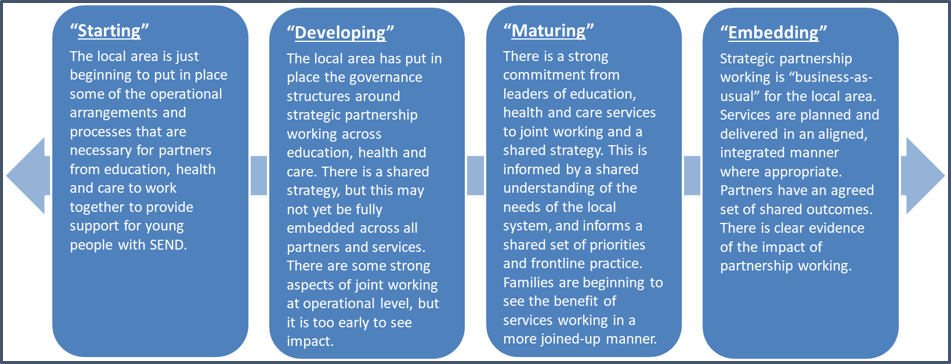Exploring the strength of education, health and care partnership working within local SEND systems
Colleagues from local areas across London and the South-East (and a few from further afield) thinking about how their local education, health and care partnerships are developing.
In autumn 2018, we published two pieces of research relating to support for pupils with special educational needs and disability (SEND) that we had undertaken on behalf of the Local Government Association (LGA). The first, Have we reached a ‘tipping point’?, sought to quantify the gap between what councils were spending on high needs and what they were actually being allocated, and the reasons for the growing gap between the two. The second, Developing and sustaining an effective local SEND system, brought together some of the effective practice that local areas had developed to sustain effective support for young people with SEND and their families in this context. The latter drew on a series of regional workshops that we undertook with leaders and professionals from local areas across England.
A year on, we were asked by the LGA to facilitate a further series of regional workshops, building on our original research and focusing specifically on exploring the strength of partnership working across education, health and care services within local SEND systems. In total, over 300 professionals from education, health and care services representing 99 local areas took part in this project.
As part of these workshops we co-developed some self-evaluation tools to enable local areas to reflect on their journey to develop the partnership structures and practices necessary to embed and sustain an effective local system of support for young people with SEND. One of those tools asked local areas to state whether they considered that they were at the stage of “starting”, “developing”, “maturing” or “embedding” their partnership journey. A key finding from these workshops was that 81% considered that they were either “starting” (20%) or “developing” (61%). A further 19% said they were “maturing”, and no local area considered that they were at the “embedding” stage. In other words, over five years on from the introduction of the SEND reforms, while all local areas considered that they made progress in developing partnership working, the majority of local areas felt that they were still at a formative stage and no local areas felt that they had fully embedded all of the partnership working arrangements needed to sustain an effective local SEND system.
A key overarching message from these workshops was that all local areas considered that they had strengthened partnership working following the introduction of the SEND reforms. The breadth of the activities where partnership working across education, health and care is needed, however, means that, while all local areas have tackled some aspects, no single local area is confident of having fully embedded partnership working across all aspects of their local SEND system. A summary of the key messages can be read here, along with the self-evaluation tools we developed through the workshops.
Drawing out some of the key themes in the development of partnerships with colleagues from local areas across the Midlands at our first workshop in this series, back in autumn 2019.



